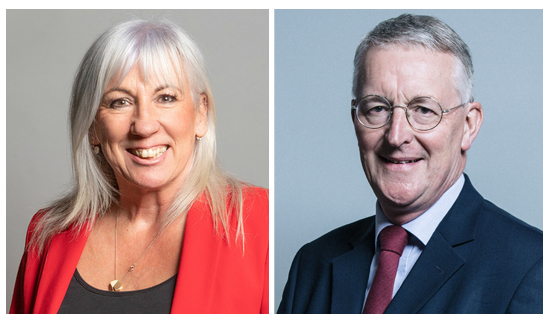News
Science Minister discusses global challenges for Biology Week 2020
- Details
- 07 October 2020
Tuesday’s Biology Week 2020 event saw UK science minister Amanda Solloway MP and Hilary Benn MP take questions on a range of science policy topics, from the future of research funding to climate change and COVID-19.
Over 80 invited guests participated in the live virtual discussion, chaired by RSB chief executive Dr Mark Downs CSci FRSB, which explored the theme of ‘Engaging with Parliament on Global Challenges’.
 Science minister Amanda Solloway MP and Hilary Benn MP, current chair of the Select Committee on the Future Relationship with the European Union.
Science minister Amanda Solloway MP and Hilary Benn MP, current chair of the Select Committee on the Future Relationship with the European Union.
Solloway, Parliamentary Under-Secretary of State at the Department for Business, Energy and Industrial Strategy, stressed her personal enthusiasm for science and the Government’s commitment to making the UK a ‘science superpower’.
As negotiations are still ongoing, she was not able to guarantee a positive outcome over the UK’s participation in European research programmes like Horizon 2020.
“We are looking to participate – we know there are advantages to working with the Horizon project. That is the best option. But it has to be fair."
Solloway said she was “absolutely working hard and tirelessly to make sure what we have in place is equally as good or better.” She congratulated the RSB on its continued outreach and communication work during the pandemic and the initiatives to inspire interest in the bioscience as part of Biology Week.
Benn, currently chair of the Commons Select Committee on the Future Relationship with the European Union, said that Government’s negotiations were currently focused on trade, and that talks on the UK’s involvement with programmes like Horizon were likely to continue beyond the upcoming deadline for negotiations at the end of October.
“I think we will be continuing to talk with our European friends and neighbours over the years ahead about what our relationship is going to look like,” said Benn. “It does appear now that the EU is looking for a different basis for the funding – it has been reported that they are arguing that we should contribute according to our share of GDP, which is 18%, and a lot of money.
“I presume part of the calculation for the Government and for the science community will be: how much will that be and how much will we get back – if we are going to get back less than we contribute might we be better off spending that directly ourselves?”
Benn also commented on potential future immigration policies in the UK and their impact on the science workforce; the political response to climate change and biodiversity loss; and the impact of COVID-19. He issued a plea for the Government to be more open about the scientific advice behind new or changing pandemic control measures.
“When you take a practical example, for example the 10pm closure of the pubs, I really would like to see what the scientific explanation for that is, as a measure – because thus far we haven’t heard it,” he said.
“I think it is so important that what the scientists are advising the Government is made available to us. Everybody understands that science is not about everybody having one view – but the more we’re open about the information and expertise, the more people can understand how difficult those judgements are and the reasoning behind those changes.”

